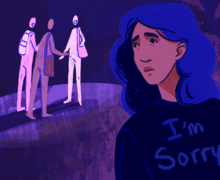SU professor with adopted Ukrainian children aids evacuation, donation efforts
Jaden Chen | Asst. Photo Editor
Julie Niederhoff, an SU professor, has two adopted children from Ukraine. Now, with Russia’s invasion, she is working to help those in the country.
There’s still one Orange to root for — The Daily Orange! Donate today and help us win College Media Madness.
Every day, Julie Niederhoff makes sure to stay up until at least 1 a.m. to keep up with the news. She gathers information, connects with all of her family. Just to make sure she can confidently greet her son when he wakes up at 6:45 a.m. with a simple text message.
“Good morning. Everyone is okay.”
Niederhoff, an associate professor of supply chain management at Syracuse University, is the mother of two adopted Ukrainian children. Her son, a high school student, has only been in their house permanently for six months. One of Niederhoff’s daughters, who has now moved out, was also born in Ukraine. Both of her adopted children have families still living in the country.
Since the Russian invasion of the country on Feb. 24, Niederhoff has been assisting the evacuation of her children’s extended family that still live in Ukraine, as well as other Ukrainian citizens.
“Nobody in Ukraine is sleeping,” she said.
In between afternoon power naps, she tries to keep in contact with everyone to make sure they’re safe. But the six-hour time difference, she said, makes communication difficult.
Niederhoff said updates from the country consist of people discussing air sirens and nearby bombings, which happen “around the clock.”
In one message, her son’s sisters sent videos of warships in the Black Sea, visible from their apartment window.
Niederhoff said that her family has sent over supplies and provided any funds necessary, not only for her children’s families but also for friends and former classmates in the area.

Megan Thompson | Design Editor
“It’s just a million small things that we’re trying to help coordinate, and money is the least personal but the most effective way to help,” she said. “If you can get $50 into the hands of somebody on the ground, they can go buy bandages, toothpaste, feminine hygiene supplies and a big bag of oatmeal.”
Niederhoff connected with the children who she would eventually adopt through New Horizons for Children. The group helps send orphans to host families for four- to five-week visits during the summer and around Christmas, according to its Facebook.
Niederhoff first found out about New Horizons through a friend who’d previously participated, and she has volunteered at and worked with New Horizons since fostering her daughter in 2013. She mainly worked in coordinating newsletters and data organization before the crisis.

Maya Goosmann | Digital Design Director
Since the invasion started, Niederhoff along with New Horizons have been communicating with different Ukrainian orphanage directors to ask about any needs they have. But, Niederhoff said, these needs shift almost daily.
“There’ll be an opportunity to do something and then the bombing shifts to a different area,” she said. “So that area is no longer safe, but maybe a different area becomes available.”
New Horizons is also setting up connections with organizations in countries such as Poland, Romania, Moldova and Latvia to provide any resources needed.
Niederhoff’s family decided to foster their daughter from Ukraine during her winter break in 2013. She said that the country was initially random, but it made sense to them, as Ukraine has limited foster-home support for its orphan population. When a child is put into state care, where the parents can no longer care for them, they’re placed into boarding schools.
During the holidays and breaks, the children have no home to return to — which is where Niederhoff and New Horizons came in.
“We just fell in love with her. She was a lovely young woman,” she said. “We really enjoyed her visit, and I knew she was interested in coming back to us permanently.”
The family decided to go through with her adoption process after her visit to the U.S. From that point on, Niederhoff said, their family became part Ukrainian.
Niederhoff said she learned Ukrainian and her family went to different cultural festivals. The family also has made an effort to shop at Eastern European grocery stores and sometimes attends a local Ukrainian church.
When her daughter was ready, Niederhoff said, they participated in Ukrainian youth groups and dance clubs. The family fully immersed themselves in the culture of the country.
With their daughter also came connections with her extended family who still lived in Ukraine, including an adult sister and her children. Even though Niederhoff and her daughter’s sister are not legally family, Niederhoff said they were friendly.
Five years later, their daughter graduated high school and had a child of her own with her fiancé. When she moved out of the house, Niederhoff said she and her husband discussed possibly hosting another child through New Horizons. This time, she said, they were sure they only wanted to host another Ukrainian child.
The family first hosted their son in the summer of 2019. When he went back to school they kept in touch with him every day through text messages and video chats.
Back in Ukraine, he has four older siblings, an aunt, an uncle, cousins and a grandma. As he was close to all of them, Niederhoff said, he was apprehensive to stay in the U.S. at first. He returned for Christmas break that year with his brother and returned for the summer.
When the pandemic hit, Niederhoff said, they were unable to host him again for almost two years. In that time, his brother, whom the family had also gotten close with over Christmas, had “aged out” of the program when he turned 18. He had to stay in Ukraine and could no longer be adopted.
When lockdown restrictions loosened, he indicated he wanted to stay with them permanently. So, with the support of his Ukrainian family, they started the adoption process. Although they live miles away, Niederhoff considers his many siblings and family members back in Ukraine part of their family.
“They’re not legally ours, but they are family… kind of like a beautiful collection of people we love.”
People outside of the family in Ukraine have personally reached out to Niederhoff due to her volunteer experience, she said. She added that they mainly ask about visas, refugee options and safe travel options. Many of them are friends of her children that they’ve kept in contact with despite their move to the U.S.
When talking about a specific case — a former classmate of her sons that was trying to escape the country — Niederhoff explained the struggle of finding a safe travel route out of Ukraine.
At the time of the interview, the teenage classmate was days away from turning 18 and being bound to the country. Under martial law, which Ukraine declared on Feb. 24, all men aged 18-60 are required to stay in the country in case they get drafted.
“We’re trying to figure out how we can safely and ethically get him across the border before he turns 18, considering he’s not allowed to cross after he’s 18. So he’s been a really big focus of our efforts,” she said at the time.
The major concern, Niederhoff said, was human trafficking. New Horizons is currently working with anti-trafficking organizations, she said, and while she’s not part of the conversations, she’d heard how traffickers have taken advantage of the growing refugee population.
“How do you tell the difference between a minivan full of actual helpers and a minivan full of traffickers?” she said. “They all look the same. They’re not wearing a sign that says danger.”
On March 21, Niederhoff told The Daily Orange in an email that the teenager had been able to leave Ukraine only 50 hours before his 18th birthday.
However, he then learned that someone he loved had been injured in the conflict. He decided to return to Ukraine only a day after his birthday.
Niederhoff has since, through contacts, provided him with an apartment and job in the city, as he originally was homeless when he returned. He can no longer leave because of martial law.
“In the end he has no doubt that someone cares about him … would fight for him, and he had the opportunity to make his own informed decision about his future. It was a heartbreaking decision either way and we fully understand and support his choice, though we grieve that he had to make such a decision,” Niederhoff said in the email.
Niederhoff said she has found comfort in the Syracuse community, from friends reaching out to neighbors putting up the Ukrainian flag outside of their homes. The family has also decided to attend community advocacy events once their children are ready, as it’s been hard with the issue being so close to them.
“We’ve had just a lot of our friends reach out to us through social media, some of our friends have brought us meals,” Niederhoff said. “For the most part, the biggest thing that we’ve had is just friends saying ‘How can I help?’ … We’ve been very, very grateful and really, just very blessed (by their support).”
Published on March 24, 2022 at 12:28 am
Contact Grace: gdkatz@syr.edu






